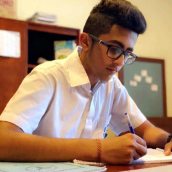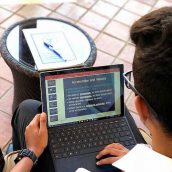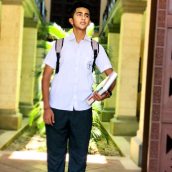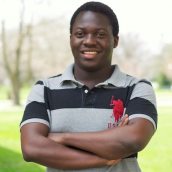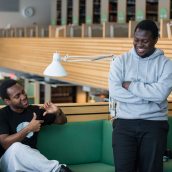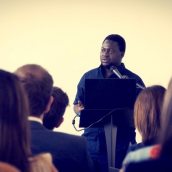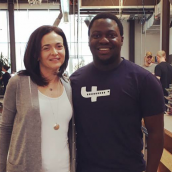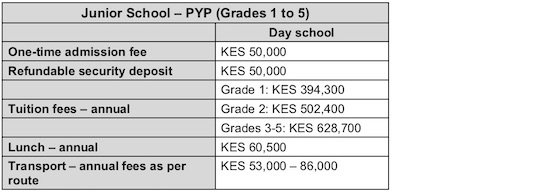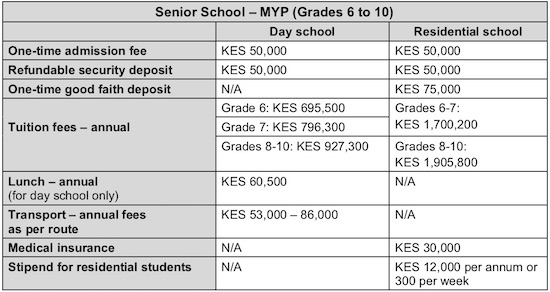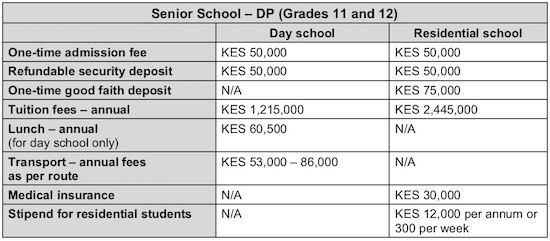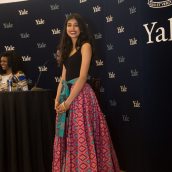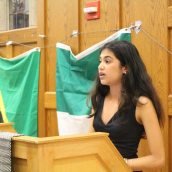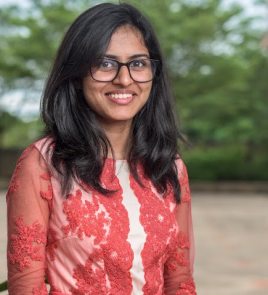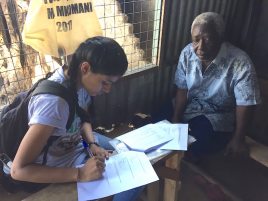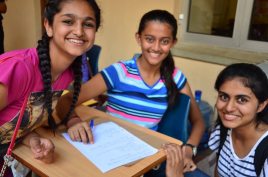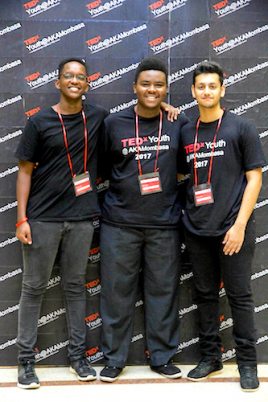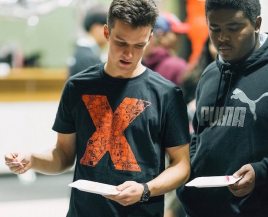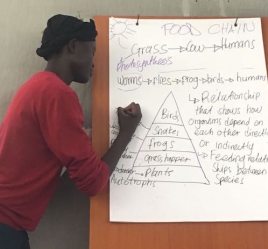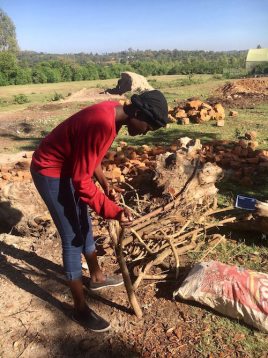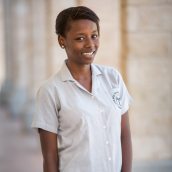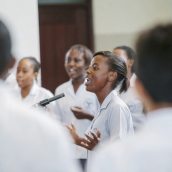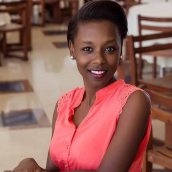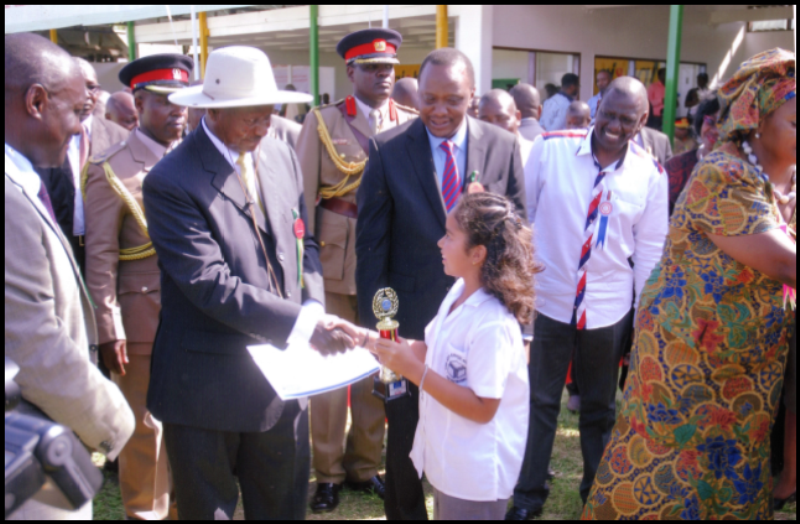Saifan Aswani: Helping the environment through reflection and determination
Incredible things happen when you slow down. When you take the time to look, listen, watch and reflect. You see the beauty and apparent simplicity in the world around you.
Saifan Aswani, a student at the Aga Khan Academy Mombasa, knows the value of taking the time to appreciate his surroundings. In fact, he says he is “bonded with nature”, and loves to sketch and photograph natural landscapes. His ambitions would see him taking to the skies in the field of aeronautics, bringing his passion for being in nature to another level.
Saifan’s penchant for reflection has instilled in him tremendous gratitude for his current good fortune to be studying at the Academy. He shares his personal journey of growth since arriving in Mombasa from the Congo: “Before I joined, I used to be a student who didn’t work hard and wasn’t independent. Coming to this Academy has changed a lot for me, not only increasing my knowledge of the concepts taught, but also developing self-respect and respect for others.” He continues, “The Academy doesn't only teach theories, but connects the concept to the real life. Living here makes me learn more about cultures as we have students and dorm parents who come from diverse socio-economic backgrounds.”
When you add all this up – a deep sense of reflection, an appreciation for nature and an education designed to support students to connect with others and improving the world around them – it is no wonder that Saifan has recently won an award for his work in the field of environmental studies.
Taking part in the seventh edition of the Golden Climate International Environmental Project Olympiad and representing Kenya and the Academy, Saifan won a gold medal in the agriculture category for his creation of a desalinisation unit.
Saifan first thought of his project idea in 2017 while contemplating the Indian Ocean which graces the shores of Mombasa near the Aga Khan Academy’s campus – he had slowed down, taking the time to look, watch and reflect. As Saifan explains, the salty water of the Indian Ocean can hinder the growth of plants in the surrounding area. Saifan developed a desalinisation unit as a low-cost, eco-friendly solution to this problem. He hopes it will help the local flora and develop more productive agricultural practices.
Compassionate and motivated, Saifan explains that, “The innovation came up as a result of research and investigating local issues surrounding my environment.” He then designed and built the desalinisation unit himself. In the same way that an artist combines simple shapes into a masterpiece, Saifan imaginatively transformed natural processes into a solution with real life applications: “The innovation consists of basic applications I studied in class: evaporation, condensation and solar energy.”
As the youngest participant from his school, he encountered many challenges in creating his award-winning design. The determined and hard-working Saifan recalls sound advice from his supervisor that helped him to persevere: "He told me, ‘I'm not telling you it’s going to be easy. I'm telling you it’s going to be worth it.’"
Throughout his time at the Academy, Saifan has realised that there was more to education than concepts, numbers and exams. As he says, “We are the leaders of the future.” He credits his experience of the past three years at the Academy for instilling in him the discipline of hard work, an appreciation of diverse cultures and the motivation to pursue this responsibility. As he has learned, “There is no elevator to the floor of success. You have to take the stairs!"
By Asif-Aly Penwala
Ham Serunjogi: Blazing a path across three continents
Look below for a video of Ham talking about his experience at the Academy.
Swimming from Uganda
Ham Serunjogi, age 23, grew up in Uganda and started swimming competitively at age 6. His parents encouraged his academics and his athletics, and Ham excelled in both. In 2010 he enrolled at the Aga Khan Academy in Mombasa, Kenya.
On his way to Kenya, he competed in the Youth Olympics in Singapore in 2010. At AKA Mombasa, he trained and studied hard, learning leadership and teamwork. He became president of the AKA Student Representative Council. At the Academy he became fascinated by digital communication. In 2011 he conducted a school project back home in Uganda, where he interviewed the IT manager at Cineplex Uganda.
To America
Ham’s drive got the attention of educators. After graduating from the Aga Khan Academy he received a scholarship to study in the United States. He pursued a bachelor’s degree at Grinnell College, where he majored in Economics.
With a fellow Grinnell student, Ham developed an app that allowed users to send short, encrypted voice recordings that would self-destruct after they were played. It was a smart solution that anticipated the rise of privacy concerns in technology. The app could work in places where voicemail systems weren’t common, like Ghana, where his app partner grew up.
The habits cultivated at AKA continued to bear fruit, he says. “The education I gained at the Academy had an emphasis on critical thinking,” Ham explains. That critical ability for problem solving fueled his achievement at Grinnell, along with a conviction that he had something to contribute.
Taking New Ideas to Facebook in Europe
As he prepared to graduate from Grinnell, Ham let himself dream big. He set his sights on the biggest social media giant he could find. “I took an unorthodox approach,” Ham said of his strategy for getting a job. “Instead of applying online, I sent an email directly to Sheryl Sandberg.”
He received responses to his email within hours, urging him to apply online. Soon recruiters were calling to set up interviews. The interviews led to an internship on Facebook’s Global Accounts Team in New York during the summer of 2015, before his final year of study at Grinnell College. There he enjoyed a surprising degree of autonomy to tackle issues that he cared about. In his first weekly one-on-one with his supervisor, she asked him, “What are you most passionate about?” He took that as encouragement and created a new initiative.
Ham is amazed by where life has taken him.
Keeping up Connections and Giving Back
Again and again, Ham has drawn on his experiences from AKA Mombasa, and the bonds among his Academy friends remain strong. Before starting his new job in Ireland, he visited friends and family in Uganda. He still connects often with his AKA Mombasa roommate, Aleem Mawji, now a student at the University of British Columbia. Ham’s friend from the AKA swim team, fellow Ugandan Joshua Tibatemwa, followed his path as a AKA swim team star and student president. Joshua also followed Ham’s example to Grinnell, where he’s now a student. Joshua competed for Uganda at the Rio Olympics last summer.
Ham took time away from settling into Dublin life to watch the Olympics on television, hoping to catch a glimpse of his friend.
Ham has launched into a life of active engagement, creating networks that make people’s lives better. He has seen how such networks make a difference. He shows dedication to paying it forward.
This spotlight is republished courtesy of AKF USA.
Fee schedule test
Fee schedules for the 2018-2019 academic year.
![]() Aga Khan Academy Mombasa Fee Schedule – 2018-19
Aga Khan Academy Mombasa Fee Schedule – 2018-19
Notes
1 The above fee is applicable to the residents of African countries and subject to an annual review.
2 A one-time Non-Refundable Admission Fee is payable for student enrolling for the first time. The admission fee must be paid to secure the place for a child in the Academy. This cannot be deferred or paid in instalments. The due date is one week after the offer has been accepted.
3 A one-time Refundable Security Deposit is also payable on acceptance of admission and should be paid together with the admission fee mentioned above. It is refundable when a student leaves the school as long as the required notice has been given in writing and “No Dues” clearance is obtained from the Academy. No interest is payable on this deposit.
4 The residential students will pay the premium for medical insurance separately as indicated in the fees table above. This will be arranged by the Academy and the premium will be due along with the first tuition fee instalment.
5 The following Residential Programme fees are applicable to international students and payable in USD: Grades 6 and 7: USD 25,800; Grades 8 to 10: USD 28,700; and DP Program: USD 35,900. All other charges are applicable as per the table above.
6 A Sibling Discount of 5% is applicable on Tuition Fees for the second child and subsequent children.
7 Tuition fee is payable in three equal instalments, no later than 15 July, 31 November, and 1 March for each academic year.
8 Tuition fees may be paid in full for the whole year with an early-payment discount of 3%, if paid before 15 July. This discount is applicable on the net amount payable after other discounts have been deducted.
9 The fees can be paid in US dollars or Kenyan Shillings. The US Dollars fees will be indicated on the invoice using the Central Bank of Kenya’s exchange rate on the invoice date. The Academy however reserves the right to change this policy.
10 The Academy will charge a monthly surcharge of 3% on the total outstanding dues older than 30 days, and in case the fees are not paid within one month’s period following the deadline, the student will not be allowed to attend classes as well as participate in the other activities undertaken by the Academy.
11 Tuition fee includes course fee, use of essential course books, library books, IT and science laboratory equipment and certain classroom supplies. This however does not include uniform.
12 Starting from Grade 4, students may also take up to three field trips including curriculum, bonding and optional trips, for which the parents will be invoiced separately. Information on these field trips will be shared with parents at least one month in advance.
13 Exam fees for MYP and Diploma will be billed separately based on actual fee from International Baccalaureate Organization (IBO).
14 The Academy no longer accepts cash for fee payments. All payments must be made by direct bank deposit, bank transfer, or Mpesa even if payment is made by a third party such as a sponsoring organization. Parents must provide the finance office (mba-bursar@agakhanacademies.org), with a hard or an electronic copy of the proof of payment showing the full name of student and Student Identification Number within 15 days of fund transfer for issuance of payment receipt. Absence of this information may delay crediting the fees reflected on your account in our system.
15 Parents are responsible for ensuring that the fees payments are made into the correct bank account of the Academy. In the unlikely event of any change in bank account, the changes will be communicated to parents in writing via a hand delivered letter from the Academy.
16 If a student wishes to leave the Academy, one term’s advance notice of withdrawal must be given in writing or one term of the annual fees will be due and payable. School clearance will not be possible until any outstanding dues are settled in full.
17 The Academy reserves the right to withhold results, school certificate, transcripts or any other information and/or document until all outstanding dues are settled in full.
18 The admitted students, who demonstrate financial needs and duly fill in and submit the application with the required supporting documents with stipulated time, can be considered for Financial Aid. An independent Financial Aid Committee is responsible for reviewing and approving any request for Financial Aid by the students.
19 The above terms and conditions may be modified or new terms may apply to reflect changes in the law or our services. For further information please contact us at
MBA-BURSAR@agakhanacademies.org.
Ruhi Kamal Manek (Class of 2016): Advocating for Africa
Ruhi Kamal Manek, an alumnus of the Aga Khan Academies in Mombasa and now a sophomore at Yale University in the United States, took away one enduring lesson from the Academy: the importance of engaging in thoughtful and careful consideration of diverse opinions. She explains that it was her time at the Academy that forced her to reexamine her old-world views and believes that her new way of thinking as a citizen of the world was borne of her stay in residence at the school:
“Living with people from so many diverse backgrounds helped me appreciate differences in people. This experience further helped me feel comfortable interacting with people from diverse backgrounds and diverse cultures at Yale.”
Ruhi was born in Nairobi, Kenya and grew up in the small town of Eldoret. It was her desire to learn and challenge herself more that made her apply to the Academy.
“I could not think of a better place to do that than at the Academy,” Ruhi states. “Being admitted to the school was the beginning of a transformative journey for me - a defining moment in my academic and personal life.”
The Academy places immense importance on meaningful public service. Ruhi participated in numerous voluntary undertakings but it was involvement in the annual school-based deworming program in the impoverished Bombolulu area of Mombasa that had a lasting impact on her. Under this program, school children receive an oral dose of deworming medicine designed to lower their risk of infection by worms and thus enhance their health and school productivity.
“The experience opened my eyes,” Ruhi says. “The thought that something so trivial as administering a few drops of medicine in a child’s mouth can transform that child’s future was inspiring to me.”
Involvement in this program inspired Ruhi in many ways. Watching the children joyfully engage with life forced her to reflect on values of humility, modesty and gratification:
“As I stood among the children, I felt as though my heart had grown twice as large, making space for these beautiful souls. I was filled with an inexplicable amount of joy as I marveled at the contentment and optimism around me. Despite the conditions in which the children lived and learned, they were radiating with happiness. I was in awe. The whole experience reminded me of a quote by the Buddha: ‘The cessation of desire is the cessation of suffering.’”
After this experience at the Academy, Ruhi continued her volunteer work at Yale. She is part of the TEDxYale team and helps to organize seminars and conferences. She is a member of Yale UNICEF and is involved in fund-raising efforts to make a difference in children’s lives globally. Committed to women’s rights regarding education and leadership roles, Ruhi also joined the Yale chapter of the Circle of Women, a non-profit organization “that educates, inspires and empowers women to become leaders and peacemakers.”
Additionally, Ruhi is involved in developing a wellness curriculum for a girls’ secondary school in Orkeeswa, Tanzania, which promotes the ideas that healthy students are better learners and that focusing on wellness now can produce huge intergenerational benefits.
“My first year at Yale has undoubtedly been enhanced through my participation in activities that I have long been passionate about,” states Ruhi. She unequivocally credits the Academy’s International Baccalaureate (IB) curriculum and the residential program for her growth and personal development. “My journey at the Academy was one of the most intense yet fulfilling growth periods of my life. I think it is safe to say that it played a key role in helping me develop the person I am today.”
When asked what her aspirations are for the country of her birth, Ruhi radiates determination. “I want to help redefine the way in which the rest of the world views my country, and more particularly the African continent. I want to be an active agent in ensuring that our stories are no longer told for us but by us.”
She is also determined to promote education in her country. “I want to tackle the issue of the lack of education. I value nothing more than the education I have been so privileged to receive and the many opportunities that have come my way because of it. I wish to help provide the same for as many people as I possibly can in my country of origin and beyond.”
By Perviz Walji
Newsletter readers please click here to return to the newsletter (browser version)
Kamila Janmohamed (Class of 2018): Reflecting on immense personal growth
My four-year journey at the Aga Khan Academy Mombasa came to a close at a much faster pace than I am comfortable with. With graduation having recently taken place, I can’t help but look back at the immense growth I have undergone personally, socially and intellectually during my time here.
The prospect of joining the Academy had always sat passively on the horizon – I had cousins pass through the Diploma Programme here long before me, and a sister who soon planned to make the shift. So, at the age of 14, it didn’t come as much of a surprise when my parents suggested I move with her.
Leaving the comfort of my home and the company of friends with whom I had spent my entire academic career proved a lot harder than I anticipated. Coming from Dar es Salaam, Tanzania, I faced less of a culture shock than many incoming students I would interact with over the years, but this didn’t soften the blow of finding myself in the middle of an entirely new education system. Here I was, an anxious teenager who had long since associated learning with the contents of a textbook, now being introduced to criteria, conceptual understanding and inquiry-based learning, all of which seemed like another language to me. Like most who have been in my position, I felt alarmingly overwhelmed by the sheer magnitude of responsibility I had to take, both for my learning as an MYP (Middle Years Programme) student, and my well-being as a residential student.
I was lucky enough to have a dorm parent that year who was very perceptive to these challenges, and through her support, and that of several of my class teachers, I was able to integrate relatively seamlessly into life at the Academy. I was particularly struck by the attitude towards learning harboured by my peers, many of whom viewed it as a communal effort and helped me adjust to the new system. This culture of intellectual humility is something that I am honoured to have been able to contribute to over the last 18 months, by tutoring MYP students in subjects I found particularly challenging in the programme.
True to the school’s mandate to develop holistic individuals, I was encouraged to join several extracurricular activities, which empowered me to pursue my passion for learning and service. One of these was a community and service group called Learn and Earn, which operated under the residential programme’s weekend activities. As the coordinator for logistics and communication, I helped organise weekly sessions with students from a nearby school where we carried out activities to promote life skills, as well as sell food items that we had cooked together to raise funds for the renovation of their school’s kitchen. This was my first experience with planning and executing a project of such a scale, and it increased my interactions with members of both the school and the surrounding communities. That same year, I was encouraged by my biology teacher to participate in the 2015 Golden Climate Olympiad where my project on cost-effective biogas digesters earned a silver award.
Two years later, I drew on my experiences as a younger, and newer, student at the Academy to fulfil my role as a Dorm Captain. I have viewed this opportunity as one of my greatest ways of giving back to the community I have grown so much in. In addition to organising orientation activities and events for the residential community, my role has required me to serve as a bridge between the students and the teachers. In considering the perspectives of both parties when discussing administrative issues, I have developed a deeper understanding of the importance of good communication and empathy. By playing a coordinative role, I have been able to engage directly with the sheer diversity of the school community. Interacting with individuals of various backgrounds and opinions has taught me the importance of engaging in open-minded and meaningful dialogue, which has enabled me to broaden my horizons. As a student leader, I have come to appreciate the importance of respect for individuals not because of the authority they hold, but simply because of the fact that they are people, a value that resonates strongly with the Academy’s vision.
Learning to balance these responsibilities and my commitments to other extracurricular programs with the demands of the rigorous International Baccalaureate Diploma Programme has stretched my abilities to manage and organise my time. Most of my courses have involved an extensive amount of critical thinking and have taught me not to look at academic subjects as separate entities. This has in part been catalysed by my Extended Essay on the economic implications of stroke, which focused on biology and economics. As a result, I have been able to make more meaningful conclusions from my learning, and to question things better. I am particularly grateful to my English teacher, whose classes stimulated thoughtful discussions about our world and why things are the way they are. Such platforms have been abundant in my time at the Academy, giving me the opportunity to voice my opinions, take on issues that I am passionate about and to develop a strong social conscience that has helped shape my identity.
As I consider what life will be like after graduation, I find myself saddened by the fact that I will soon be in a new environment without the strong network of support from teachers and students I have built here at the Academy. To these people, and my family of course, I owe not only my intellectual growth but also the strong sense of self I have developed. These are things that I hope to carry with me as I move on to pursue a degree in Global Affairs at Yale University, now with a larger family, concentrated in a region of the world I look very forward to coming back to work in.
By Kamila Janmohamed
Muriuki Njonjo (Class of 2017): Giving back through leadership and empathy
My goal in life has always been to be the very best version of myself that I can be. From the time I joined the Aga Khan Academy Mombasa for my International Baccalaureate (IB) Diploma Programme to when I graduated, that was the greatest period of personal growth in my life. The Academy changed my way of thinking, my way of doing things and informed my purpose in life.
Through a strong emphasis on the intrinsic value of education, the Academy had a lasting impact on me. I remember fondly living in residences which undoubtedly prepared me for living away from home in university. Residential life helped form bonds of friendship that I can confidently say will last a lifetime. The wisdom of dorm parents like Mr. Dudi and Mr. Prashant always helped me get through the rough tides of the IB Diploma Programme, and their words are still very much applicable to my daily life today.
In many ways, the Academy added great intrinsic value to me. However, there was more to that. The Academy demands of all its students a contribution. We lived in a space where we all felt we had to bring something to the table to the benefit of the larger community. It was in this sense of collective responsibility that I found my niche as an active member of the AKA Mombasa community. I was privileged to serve the Student Council as Secretary of the Finance Committee, a role that made me a steward of the student body’s finances. Alongside my committee, I approved the allocation of roughly US$1000 towards various service projects organised by students which had an impact on the local Mombasa community. The importance of giving back and empowering the less fortunate is built into the very fabric of the Academy’s mission and that helped me develop a profound sense of empathy.
I had the opportunity to establish a service club known as the Leo Club with the help of the local Lions Club. We went ahead to raise money for corneal transplants. With the help of my mentors Adnan and Aalia Visram, I co-founded the Academy’s first ever TEDxYouth event with my friend Preyansh Kaushik. Through TEDx we provided an incredible platform for members of our AKA Mombasa community to share their unique perspectives with millions of people across the world. TEDxYouth@AKAMombasa remains one of my proudest achievements at the Academy. Alongside my friend Inaara Savani and the constant guidance and support of Ms Alex Holland, I organised a workshop for Year 9 students on the Syrian refugee crisis. This opportunity eventually led me to Uganda in the Summer of 2016, where I volunteered as an English teacher at the Kyangwali Refugee Settlement. I was also honoured to be the Finance Executive of the CanCare club which organises the Academy’s annual blood drive. All these incredible opportunities have taught me valuable skills and have made me a driven person. Of course, all this would not have been possible without the support of my peers and faculty members.
One cannot speak about their time at the Academy without mentioning the rigorous academics geared towards creating critical, analytical and reflective thinkers. It’s through Mr. Vlad’s classes that I discovered my passion for politics because of the power it has to effect change in everyone’s lives. The strength of the curriculum and the way the teachers delivered it definitely prepared me for university workload. This combined with the numerous opportunities to get involved afforded to me ultimately won me a full scholarship to the University of Waterloo in Canada where I am currently majoring in political science and financial economics with Honours.
I still carry the spirit of AKA Mombasa with me. Since joining Waterloo, I have been involved in the organisation of the annual TEDx event, I have delivered a start-up pitch for funding at Velocity, the world’s largest free business incubator, and I have been privileged to join the first incorporated blockchain community management firm in North America as the Head of Public Relations. For now, I will continue to do what the Academy taught me to do best: contribute to my community and live out my potential in my truest self. In future I hope to go back home to Kenya and use my education and skills to help make a difference in people’s lives. Until then, I continue to live in a permanent space of gratitude for the person I am today, which I owe to the Aga Khan Academy Mombasa.Josephine Awino (Class of 2018): Cultivating a passion for sustainable agriculture
Josephine Awino, alumna of the Aga Khan Academy Mombasa, will be attending Wellesley College for her undergraduate studies in environmental science. She shares a reflection on her personal journey at the Academy in which she developed a sense of self and fostered her passions.
I was born in Mombasa, Kenya where my father worked as a photographer and my mother was a housewife. When I was three years old, however, my father died due to a tetanus infection. With no support from anyone in Mombasa, my mother was forced to move back home in Kisumu where the extended family was. Upon moving back, she had no job but still had to find a way to support my family as no one else would. She started farming vegetables at the family farm and sold her produce at the market and that’s how we survived for some time. At that time, farming wasn’t enough to support family needs and many times my family would go without a meal even for a whole day. Despite my mum farming food crops we still ended up having no food many times. I was enrolled at Tido Primary School where my siblings and I were fortunate to get sponsorship from an NGO who were willing to pay for our fees given our performance in class. My mother tried to carter for our uniform and food but she still wasn’t earning enough; when the NGO stopped supporting us educationally, I found myself home due to lack of fees. At that time, my mother wasn’t even able to pay for exam fees and went home without doing exams for the next grade. Coming from this background, where I hated my life and surroundings, I never stopped hoping for a better future for myself and my family. I just wanted to live like a normal child, doing normal things and not having to worry about whether I’ll have food for the next meal, or enough clothing, or if I’ll be allowed to attend class without the required fees.
Looking back at my mother who was raising five kids playing the role of both a mother and a father, I knew that she was doing the best that she could to raise and provide for us and I wanted to be able to help her in the future. I not only wanted to help her, but I didn’t want any family to end up like mine and kept on wondering what would happen if my mom went to school. She’d probably have a job and be able to support all of us comfortably. This is what motivated me all throughout my primary school, despite wanting to give up most of the time. I had managed to remain one of the top performing students in the class and my name never failed to be in the top 3. In grade 6, as one of the top 3 students, I was selected by the school for an interview for the Aga Khan Academy Mombasa where, if I was successful, I would get a full scholarship. I passed the interview and joined Aga Khan Academy Mombasa in January 2012 pursuing world class education in an environment that allowed me to focus on education while also taking part in extracurricular activities.
After high school, I will be joining Wellesley College in USA where I plan to venture into environmental science. Getting higher education abroad is particularly important for me. Since I am passionate about the environment and development, studying abroad will allow me to look at both issues from an international scale teaching to apply different solutions to local problems that Kenya currently faces. I will also be getting to know the bigger picture about environmental instability and development not only for Kenya but for the world at large; this is something that would be very hard to get at a local university. Getting to learn with people from all over the world is also another thing to add as I don’t only get to interact with them but I will get to know the kind of world they live in and what issues they face and how they approach them. This is beneficial for my growth and development in terms of applying different approaches to a problem, based on different perspectives from people all over the world.
After my studies I plan to come back to Kenya where I intend to apply all that I have learnt to solve local problems within my community and my country at large. One way I would like to do this is provide more educational opportunities for girls to attend school, making it a right rather than a choice so that less people end up like my mother did. I also want to venture into sustainable agriculture in a way that they would maximize their output while still not harming the environment. I want to make agriculture a reliable source of income for people in my community.
In my free time I like to read a lot. I read books and also read online. Reading helps me learn more about the world and also walk in other people’s paths of life. Through reading novels, I live another life. Through reading online, I tend to learn more about myself, exploring different things about myself while also learning about different issues affecting the world today. I research a lot about current issues mainly related to the environment and development just to keep myself up to date as well. As a person I would say that I’m an inquirer as I always want to know more and just look at another perspective on an issue. This helps me keep a balanced and understanding point of view especially when I interact with people.
I am also quite independent. Growing up and having no one to really rely on, I started sorting out my issues on my own without bothering my mum - this has really helped me grow to become my own person. My absolute passion lies with the environment and it’s beauty. This is something that I have been interested in from childhood because I’ve always felt a connection with nature and because of the different forms of environmental degradation I’ve seen which still haunt me up to date. When I see the environment degrading, even when I have no connection whatsoever with the issue, I usually feel responsible for the issue and grow this urge within me to stop the issues from carrying on. I have taught about the importance of the environment to various people in my community including students from my former school where I held my personal project - this has improved environmental conditions in my community.
By Josephine Awino
Mary Favour (Class of 2015): Ambitions to build a better future
For a while, getting an education was a process for Mary Favour. She would rise early in the dark – at 4:00 am – and make the long trek to school on foot with her three siblings, arriving at around 6:30 am each day. By the time they returned home to Mombasa, it was 7:00 pm. The rest of the evening was spent helping their mother around the house and finishing their homework.
It wasn’t easy, Mary recalled.
“My sisters and I grew up with a single mother,” she said. And resources were tight.
When the electricity bill wasn’t paid, the Favour children would study under the dim glow of a kerosene lamp or by candlelight. The four siblings had limited school supplies and relied on Mary for many of their study materials.
“We got awarded books if we topped the class,” she explained. “Sometimes we’d get textbooks, other times we’d get storybooks or novels. It was an incentive that the teachers had to motivate students.”
A new opportunity at the Aga Khan Academy Mombasa
Despite the obstacles, Mary said her mother was determined for her to succeed. She pooled her resources to give Mary a much-needed laptop in grade 9. By then, things had begun to turn around – Mary had received a full scholarship to study and live at the Aga Khan Academy Mombasa as part of its Talent Identification Programme, a programme that provides students from more disadvantaged backgrounds the opportunity to attend the Academy on full scholarship. She would graduate in 2015 and go on to study at the University of Toronto in Canada, also on full scholarship.
Now a second-year student at university, Mary hasn’t forgotten her difficult upbringing or her roots. In fact, the struggle to get an education early on has instilled in her a strong desire to give back to her community and help others like her get a shot at a better life.
“Six years of growth, skill and a good education” at the Academy was “a gift,” Mary said. “I want to [give] a gift to someone else.”
In particular, she’s learned the importance of independence, humility and sacrifice – lessons she put to use during her Academy days.
Mary joined the Aga Khan Academy in 2009 as part of the first batch of students in the Talent Identification Programme. While there, she participated in a range of activities, including choir, soccer and debate, with the same level of perseverance her mother had taught her. She quickly excelled academically, becoming an honors student in grade 10, and also challenged herself in extracurriculars – musically in competitions and as the assistant captain of her hockey team.
Helping others through community service
Beyond this, Mary fostered a passion for community service and activism rooted in her desire to help outsiders fit in. She led the ‘Just Say No’ initiative, a programme focused on rehabilitating primary school girls in Mombasa who had turned to prostitution in large part to support their families financially.
She worked with these girls for three years, exposing them to the same opportunities she and other students had the privilege of in their own education, including sports and debate. She hosted workshops on public speaking and art, as well as sessions with counsellors and strong female mentors, and invited the girls to perform at the Academy’s talent competition.
“The aim was to help them feel integrated into society but at the same time equip them with skills that would make their education holistic,” Mary said. The mission was especially important, she said, because of the gender gap she saw in Mombasa’s primary schools and the way in which this unfair system contributed to larger problems down the line.
“That inequality creates an imbalance that marginalizes women in our society,” Mary said.
Under her leadership, the club received three awards and became one of the most successful student groups on campus.
Supporting other students to succeed
In addition, Mary founded the ‘I Know Who I Am’ initiative, a programme that integrates scholarship students like herself into the Academy community while understanding that they needed to “stay in touch with home and not forget their society,” as Mary explained.
“I wanted to celebrate the diversity that came with these students but at the same time make sure that they don’t lose themselves,” she said. So she ran workshops on pluralism and open-mindedness, ate food and played games the students would recognise from home and “held discussions on what it meant to be part of a community but remain true to yourself.”
In the summer of 2017, Mary interned with the Students for International Development. The non-profit organisation was founded and is run by students. While there, she worked with the Orphan Sponsorship Programme as project manager for about two months. Mary and her team focused on the Simboyi Primary School in Vihiga, in the west of Kenya. They were in charge of the remedial education project for orphans and also worked on projects to support students financially.
After conducting interviews with some of the students in Vihiga, Mary and her team developed a means by which to help them be better equipped to reach their full potential. According to Mary, a number of the students came from families that were struggling to make ends meet. Some, she recalled, told her they only had one meal per day, which usually consisted of just ugali or porridge. Others said they didn’t eat at all. Further, a number of those who performed well in class were unable to pay for their exams and had to sit them out instead.
With Mary’s help, the organisation created a scholarship to help these students. The award, which she said covers basic health care, one meal a day, a yearly uniform and exam fees, will be able to assist 55 students during the current academic year at Simboyi. The hope is that the sponsorships will continue into the next year if budget and fundraising allow.
Real-time results and change like this mean the world for Mary, not least because she knows firsthand what it’s like to have the academic situation and resources not in your favour.
“I was a child with big dreams and no way of actualising them until I joined the Academy,“ she said. “I want to be for someone else what the Academy was to me.”
Catalyzing change for a better future
Mary believes education is one of the best tools to rid our societies of poverty, and she’s determined to be in a position to support students so they have better paths forward at their disposal than what she had. That’s why she plans on returning to Kenya after she’s obtained the necessary experience and skillset to properly give back to her country and community.
Currently majoring in human geography and diaspora and transnational studies and minoring in African studies, Mary thinks that, through the study of cultures and international development, she can better understand how to bridge the gap between rich and poor at home. Her hope is to protect the rich cultural diversity of Kenya but also contribute to changing the country so that it is better able to develop and sustain itself and compete and interact on a global scale more effectively.
“Kenya is at such a pivotal moment in the making of African history,” she said. “It has so much potential. I just want her to maximize her potential. I want to help her do it.”
Mary is uniquely positioned to kickstart such a change at home. Her pluralistic perspective on the world and passion for country could be just what Kenyans need to motivate their leaders to be better and to take action to institute real change. And if her triumphs at the Academy are any indication, Mary’s motivation may just be contagious.
By Farah Mohamed
Interview with Alison Hampshire, Head of Academy in Mombasa
Students Cinzia Torriani (year 10) and Alisha Doshi (DP1) interviewed Alison Hampshire, the new Head of Academy at the Aga Khan Academy Mombasa. They discussed passions, dreams, important themes in education and life lessons.
Hello Mrs Alison. Could you please share a brief background of yourself?
Hello girls! Of course! Well, I was born in Leeds, North of England, and I lived there until I was 17. I left home to attend the University of Sussex in Brighton, which is on the south coast of England. I studied for a music degree and was even a musician for a period of time! I then decided to train to be a teacher and started my teaching career in Brighton. After a little while, I got involved in theatre and became involved with a theatre group. I then ended up in Africa teaching, went back to England, ended up in Hong Kong, then Malaysia, and now back in Africa – Kenya more specifically.
If you were to describe yourself in a sentence, what would it be?
I think in a sentence I would describe myself as honest, passionate about education and protective. I am like a lioness and will protect the people that I am looking after, and that would include my students, my staff and my own family. My birth sign is actually a Leo, and my animal in the Chinese culture is a tiger, so I could see myself as a tiger and a lion – both loving yet protective animals.
Those are very important traits in a person. Similarly, what are the two things that you are not?
I know that I am not a mean person. I am not a very sporty person either!
Can you please tell us a little more about yourself and your family, for our readers to get to know you better? Is there something about yourself (a few interesting facts) that you would want students to know?
One of the things that perhaps people don’t know about me is that I really, really like heights, which is why I have done many activities that involve taking the risk of jumping out of an aeroplane, abseiling or even paragliding. I have done a number of things that require me to take a risk. And so, although I am sometimes hesitant, every time I have a birthday ending with 0, I like to give myself a new challenge and do something that is very difficult for me. There is nothing greater than accomplishing your goals.
The other thing is that I really like spicy food, so if I’m ordering a curry and the option is mild or hot, I would go for the hot one!
What is the most valuable life lesson you have ever learnt that you feel has had the biggest impact on you as a person?
One of my most valuable life lessons was when I was only 15. It was the first time that I ever felt that I had failed. When I was young, I played the flute and I received a distinction on every exam that I took, until I did my grade 6 (bronze level) exam where I got a merit. In the scheme of things, that’s not terrible, but it was devastating for me, and the life lesson I learned was that you have to pick yourself up, brush yourself off and try harder next time.
I was not prepared to proceed to grade 8 (gold level) until I was convinced that I was going to get a distinction, and so I worked and worked and worked and eventually that’s what happened. But the feeling I got when I was disappointed in myself was really hard, and the lesson I learnt was that sometimes you just have to forgive yourself and carry on.
What made you choose education as a profession? Is it a calling, a service, an agency or a love?
I started out as a musician and then realised that it wasn’t what I wanted to do with my life. It was selfish in a way – it was about being the best you could be, it was a very competitive environment. Also, while growing up at school, people had always said to me that I was such a good teacher. And so when the music didn’t work out as a profession, I looked to other options and tried many things out before deciding to be a teacher, but when I finally did decide to be a teacher I knew it was the thing I should have been doing from the beginning.
What values do you promote in terms of a learning environment?
I find that English literature provides all sorts of scenarios by which students can engage with issues and also aids in developing empathy. And I think that, as an English teacher, the important thing you need to develop is for students to be able to step inside another world and think about the lives of others.
And so the novels that I choose would possibly be about those that have challenging themes. I remember teaching To Kill A Mockingbird in a school which was entirely white, to help a rural British community understand the challenges of the themes in that novel. It was a very interesting experience. I also find that this is what literature can do – it can help us to see other people and other people’s worlds, and help us develop our understanding of different perspectives and ideally empathy for others.
I completely promote pluralism – it is also one of the main things literature can do. I remember having read the Chinua Achebe trilogy, and it was the beginning of my love for stories, literature and the love for Africa as well.
Why the Aga Khan Academy Mombasa?
Mostly because of the vision and the mission of His Highness. I completely believe that education is about empowering young people and that it is about change. I have always felt that I have gone into education to make a difference, not necessarily one that I can make but one that can be made through the lives of others through young people. And so, when I came across the mission and the vision of the Academy, it really seemed to synchronise with my own values. The other attraction was that having lived in Africa for my very first posting outside of Britain, the thought of returning was very exciting.
The community of students here is one that I felt was interesting to join. To be honest, in the past I have never worked in a situation where there were local teachers in an international school – it has mostly been expatriate teachers, and I found that to be a very exciting prospect.
What is something you have never done before and you may be able to do here in Mombasa?
I have never eaten a whole lobster! Actually, I would love to learn how to kite surf over the next few years. I would also really like to go and find some great African music and spend a whole night dancing!
What is your take on the students at the Academy, based on your interactions with them thus far? Do they measure up, in terms of mindset and potential, to those you have experienced in the west?
I think it is really hard to generalise a whole student body, especially with the regard to the fact that I have mostly taught in the east in Asia rather than in the west, but there is definitely a big difference between students in England and students I have taught in an international setting.
I have found that students here are really open and really social, very welcoming, and they seem quite interested in the adults in their lives. They are polite and also seem to be inquirers. My most intense experience was when I went on the DP1 trip, and I felt that the level of interaction the students had with each other showed great compassion with one another. They asked great questions, seeming to be very interested and open-minded, which are very good traits.
Is there a favourite quote or saying or aphorism – a thought that you live by, a statement that encapsulates your personal view?
There is a quote by Gandhi which I live by, and it encapsulates my personal view. It is basically about self-esteem and states that nobody else is in charge of your happiness, other than yourself. It is “Nobody can hurt me without my permission”. I think that how you react to a situation is in your control, and over time I have learnt that it is nobody else’s power to do anything to you; physically they can, but emotionally how I react is how I am – which is the lesson I have learnt.
Finally, is there anything else you’d like our readers to know about you?
The really important thing that I would want to let everyone know is that I am having a lot of fun so far, and I am really enjoying my time here, and I hope that carries on.
